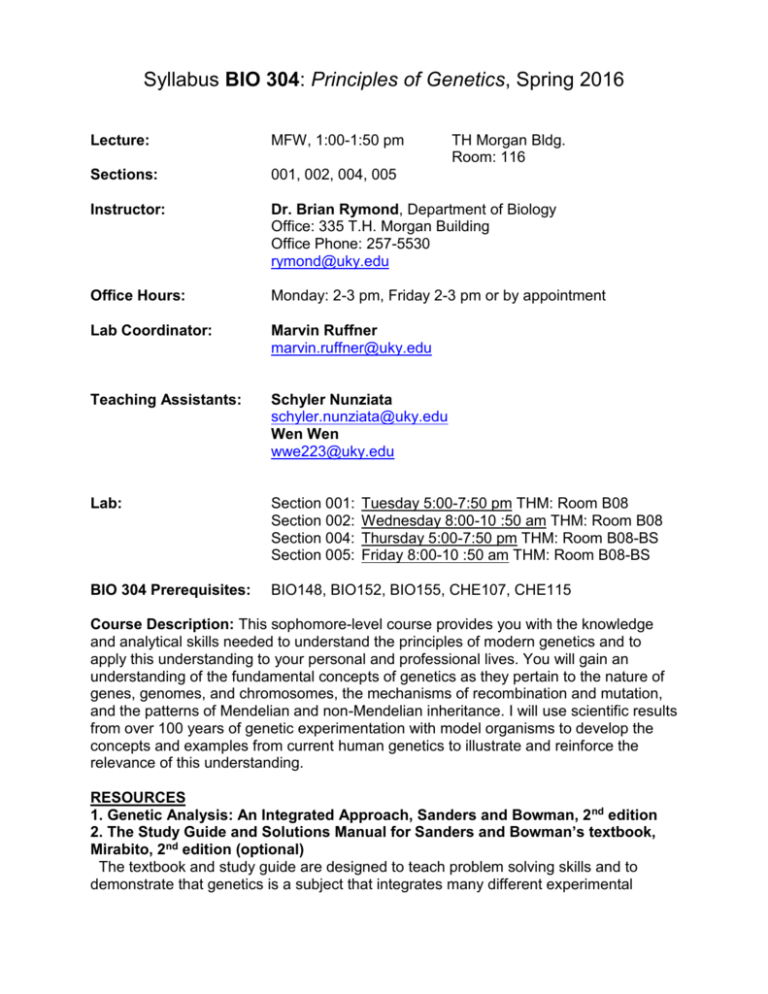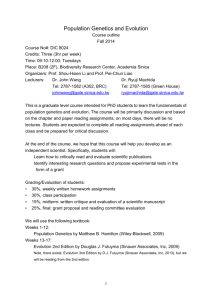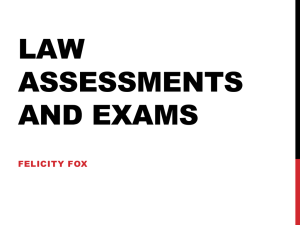Genetics - Biology
advertisement

Syllabus BIO 304: Principles of Genetics, Spring 2016 Lecture: MFW, 1:00-1:50 pm TH Morgan Bldg. Room: 116 Sections: 001, 002, 004, 005 Instructor: Dr. Brian Rymond, Department of Biology Office: 335 T.H. Morgan Building Office Phone: 257-5530 rymond@uky.edu Office Hours: Monday: 2-3 pm, Friday 2-3 pm or by appointment Lab Coordinator: Marvin Ruffner marvin.ruffner@uky.edu Teaching Assistants: Schyler Nunziata schyler.nunziata@uky.edu Wen Wen wwe223@uky.edu Lab: Section 001: Section 002: Section 004: Section 005: BIO 304 Prerequisites: BIO148, BIO152, BIO155, CHE107, CHE115 Tuesday 5:00-7:50 pm THM: Room B08 Wednesday 8:00-10 :50 am THM: Room B08 Thursday 5:00-7:50 pm THM: Room B08-BS Friday 8:00-10 :50 am THM: Room B08-BS Course Description: This sophomore-level course provides you with the knowledge and analytical skills needed to understand the principles of modern genetics and to apply this understanding to your personal and professional lives. You will gain an understanding of the fundamental concepts of genetics as they pertain to the nature of genes, genomes, and chromosomes, the mechanisms of recombination and mutation, and the patterns of Mendelian and non-Mendelian inheritance. I will use scientific results from over 100 years of genetic experimentation with model organisms to develop the concepts and examples from current human genetics to illustrate and reinforce the relevance of this understanding. RESOURCES 1. Genetic Analysis: An Integrated Approach, Sanders and Bowman, 2 nd edition 2. The Study Guide and Solutions Manual for Sanders and Bowman’s textbook, Mirabito, 2nd edition (optional) The textbook and study guide are designed to teach problem solving skills and to demonstrate that genetics is a subject that integrates many different experimental approaches. The ISBN for a bundle of both books plus access to Mastering Genetics (see below) plus access to the etext is (Package ISBN-13: 9780134099576). Dr. Mirabito (UK Biology Department) wrote the study guide and solutions manual for this textbook. The study guide provides many of the learning aids he has developed from more than a decade of teaching genetics to UK undergrads like you. The textbook and study guide help you learn problem solving, which has been the #1 request of BIO 304 students on past course evaluations. Copies of these books will be on 2-hour reserve in the Young library and used copies should be readily available. The text and study guides will be used again next semester, so if you want to get some of your money back, you should be able to re-sell to the bookstore at the end of the semester. 3. Mastering Genetics This is an online resource for completing homework assignments. Register on the Mastering Genetics website (www.pearsonmylabandmastering.com) using the access code that comes with your purchase. Use the course ID rymond87829 to find my course and the BIO 304 Mastering homework assignments. Access to Mastering Genetics and an E-text version of the textbook is “free” when you purchase the hardcopy of the textbook and study guide as a bundle from the local bookstores. This bundle (Package ISBN-13: 9780134099576) is also available directly from Pearson (http://www.mypearsonstore.com/index.asp ). You are also welcome to purchase access to Mastering and the E-text separately from Pearson (http://www.masteringgenetics.com/site/register/new-students.html). What’s the least expensive option for BIO 304? Purchase access to Mastering Genetics only from Pearson and use the books on reserve in the library or purchase used copies of the books. What’s the next least expensive? Purchase access to Mastering Genetics and the etext from Pearson. 4. Canvas BIO304-001(2, 4, & 5) Principles of Genetics 2016 Check UK Canvas for grades, announcements, key term lists, and course information (e.g. syllabus, lecture and exam schedules, reading, homework assignment schedule). 5. Clickers I will present clicker (automated student response system) questions during most lectures. Your credit for answering clicker questions will constitute your in-class participation grade (see below). If you have not previously used clickers in a UK course, you will need to purchase one (from the UK bookstore or online) and register your device on Canvas so that it will be linked with this class. GRADES: Category Exams 1-4 (each 100 points) Final Exam Lab Grade In-class participation (clicker) Homework Total Points 400 200 200 100 100 1000 % of Grade 40 20 20 10 10 100 Final Letter Grade: Your letter grade will be no lower than the following: 90% or above = A; 80 to 89% = B; 70 to 79% = C; 60 to 69% = D; below 60% = E HOMEWORK: All homework for this course is on the Mastering Genetics site (www.pearsonmylabandmastering.com). Homework is due by 11:59 pm on the due date (typically on a Sunday evening). Schedule for homework assignments is posted on Canvas. There are two types of homework assignments: 1) Key Terms. This homework assignment will be composed of questions testing your understanding of the key terms assigned for the topic to be discussed in the coming week (key term lists for each chapter will be posted on Canvas). Define all the key terms and use your list of definitions and the textbook to help you answer these questions. Each Key term homework is worth 5 points, and there will be 8 Key terms homework assignments throughout the semester, for a total of 40 possible points. There will be NO CREDIT given for late Key Terms homework!! 2) Problems. The second homework assignment will be genetic problems that you solve. The solutions will require you to apply your understanding of the principles and ideas covered in the course to date. These problems are similar to what you will encounter on the exams. Each problem assignment is worth 10 points, and there will be 8 Problem assignments throughout the semester, for a total of 80 possible points. Problem assignments may be turned in late, but there will be a 25% penalty for each day that it is overdue (with a maximum reduction to 50%). Note that you can earn full credit for homework if you obtain 100 out of the total 120 possible points (~83%) on the homework assignments. CLICKERS: I will ask at least one clicker question during lecture. You will get full credit for the question if you give an answer, even if it is not the correct answer. Each lecture in which I ask clicker questions will be worth 3.3 participation points, and there will be approximately 34 clicker days, for a total of 112.2 possible points. There is NO WAY to make up missed clicker points. However, note that you can earn full credit for participation if you obtain 100 out of 112 possible points (in other words, you can miss up to three clicker days and still get full participation credit). LABORATORY: The BIO 304 laboratory was designed as an integral part of the course and is designed to enrich your understanding of genetics. The BIO 304 lab provides hands-on experience with genetic techniques that extend and reinforce concepts covered in the lectures. Four laboratory projects will be carried out, and each will take four to five weeks to complete. Information on the lab schedule can be found on the BIO 304 lab website, (https://sites.google.com/site/bio304lab/). I will include questions that require your understanding of laboratory experiments on exams to help reinforce the link between the two learning venues. Your laboratory grade will be based on two types of open response questions that are completed during the lab sessions (no lab reports in BIO 304!). One set of open response questions will be given to you at the start of every lab. These questions are called “inquiry questions” that provide an opportunity to design experiments, predict results and generate hypotheses. The other set are “write-up” questions, in which you will have an opportunity to record observations and analyze data. Keep a lab notebook of printouts from the lab website and your graded, written lab assignments and refer to these as you answer questions posed in lab and as you study related material from the lectures. You need to come to lab focused and ready to go. Both inquiry questions and writeups must be completed before you leave lab. You will get full credit for reasonable answers firmly based on the principles of genetics. In other words, the responses do not have to be “100% correct” but they do need to be defendable as evaluated by your teaching assistant. There is no way to make up missed laboratories. However, if you miss a lab due to an excused absence, you can take a quiz to earn points towards that lab. You must contact Marvin Ruffner (marvin.ruffner@uky.edu) within 24 hrs. of missing your lab to make arrangements for the make-up quiz. The format of the quiz will be oral or written or a combination of both and will cover the content, procedures, results, and data analysis in that lab. Excused absences are as described in the University Bulletin (http://www.uky.edu/registrar/content/2015-16-bulletin-table-contents). EXAMS: There will be four exams during the semester. Exam questions material covered in lectures, key terms/concepts, homework assignments and relevant content covered in in lab. The exams will have a multiple choice format. Exam results and answer keys: • Exam scores and answer keys will be posted on Canvas. • If you find mistakes on the key or wish to argue for more points on one or more questions, WRITE out your argument and turn it in to me by email or in person within one week of posting of that exam’s answer key. You will be allowed one regrade request per test so be sure to include all your questions in that request. FINAL EXAM: The final exam will be a two-hour cumulative multiple choice exam. Specific topic information will be provided to you at the start of dead week. Don’t freak out about exams! Only 60% of your final grade is determined by the tests. That means that if you average 50% on exams and earn all the participation/homework/lab points (which is very do-able), you’ll earn a C in this course (do the math!). Likewise, a 67% average on tests plus 100% on the rest will earn a B, and 84% on tests plus 100% on the rest will earn an A. MAKE-UP EXAMS AND QUIZZES: If you miss one of the exams because of an excused absence, contact me immediately and present me with written validation for your excused absence. Valid excuses are as described in the University Bulletin. All makeup exams will be given on the last scheduled day of classes during dead week (4/29/2016). If you know of university sanctioned events (intercollegiate sports or other professional engagements) that will cause you to miss more than one test in BIO 304, then meet with me during the first two weeks of the semester to make special arrangements for multiple make up tests. MAKING UP THE FINAL EXAM: The final exam is scheduled for 10:30 AM on Tuesday May 3, 2016 . If you miss the final exam because of an excused absence, you will be given an “I” letter grade for the course. See me immediately with validation for your excused absence and we will make arrangements for you to make up the exam sometime after the semester has ended. MIDTERM GRADE REPORT: Projected letter grades (based on scores from Exams 1 and 2, clickers, the lab, and homework) will be posted during the UK midterm reporting period. I will use the grading scale described above to determine your projected letter grade. You should use these projected letter grades as an assessment of your performance in the class up to that point. Your final course grade may differ from your midterm projected letter grade. CHEATING: All tests are “closed-book”, meaning that you are not permitted to use written information in the form of notes, books, or physical or electronic “crib-notes” during these examinations. Behavior considered cheating in this course includes the following: 1) using notes of any kind (physical or electronic) during a test or exam; 2) copying from other students during tests or exams; 3) talking to other students during tests or exams; 4) handing in homework that is not your own work (i.e. plagiarism); 5) using someone else’s clicker or having someone else use your clicker. The minimum penalty for these offences is an “E” grade for the assignment. ELECTRONIC DEVICES: Electronic devices (laptop computers, tablets, cell phones, smart watches, etc.) cannot be used during exams. All electronic devices must be stored and not be visible to the student or anyone nearby (in backpack, coat pocket, etc.). Based on this announcement, any “open” device (i.e., lit screen) observed during an exam will be considered evidence of cheating. STUDENTS WITH DISABILITIES: If you have a documented disability that requires academic accommodations, you must provide me with a Letter of Accommodation from the Disability Resource Center (Suite 407 Multidisciplinary Science Center. Phone: 257-2754. Email: lbstew2@email.uky.edu






